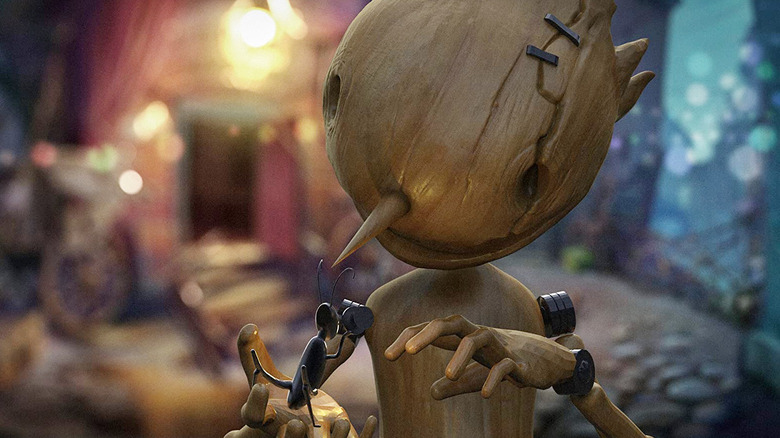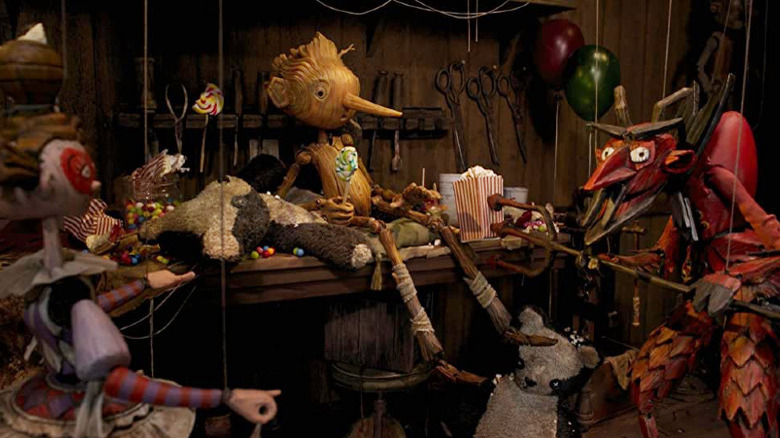Guillermo Del Toro Considers Pinocchio As Part Of A Trilogy With Devil's Backbone And Pan's Labyrinth
For a long time, Guillermo del Toro's "Pinocchio" seemed doomed to become one of his many, many unrealized projects. Announced in 2008, this new take on Carlo Collodi's novel "The Adventures of Pinocchio" was penned by del Toro and his frequent co-writer Matthew Robinson ("Don't Be Afraid of the Dark," "Crimson Peak"), with del Toro also splitting helming duties with "Fantastic Mr. Fox" animation director Mark Gustafson. But just as exciting as the film's top-tier creatives is its story, which shifts the classic tale of the titular wooden puppet and his quest to become human to Fascist Italy under Benito Mussolini's reign of terror.
A dark fairy tale about children going on fantastical adventures in times of war and violent social upheaval is familiar territory for del Toro. His 2001 horror film, "The Devil's Backbone" centers on an orphan boy who sets out to unravel the mystery behind a ghost that haunts the isolated orphanage where he resides, all while the Spanish Civil War looms ever closer to reaching his home. In 2006, del Toro would release a spiritual follow-up to "The Devil's Backbone" titled "Pan's Labyrinth," its story focusing on a young girl who carries out a series of tasks at the behest of an ancient faun, even as her cruel stepfather, a staunch supporter of the Francoist regime, hunts left-leaning rebels in the aftermath of the Spanish Civil War.
"Pinocchio," while neither a live-action film (it's stop-motion animated) nor a Spanish-language movie (it's an English-language one) like "The Devil's Backbone" and "Pan's Labyrinth," clearly has a lot in common with those two in terms of their lead characters, genre elements, and themes. In fact, del Toro feels it forms an unorthodox trilogy with the pair.
Childhood and war
With a dozen films under his belt as director (including "Pinocchio"), it's become obvious there are specific motifs del Toro is drawn to as a storyteller. Parenthood, for example, is a topic that's reared its head in del Toro films as disparate as "Cronos," "Hellboy," and "Pacific Rim." War is another issue his movies have returned to over and over, even when it's firmly in the background like in "The Shape of Water" and "Nightmare Alley" (which take place in the middle of the Cold War and WWII, respectively). But in the cases of "The Devil's Backbone" and "Pan's Labyrinth," del Toro weds both those subjects with childhood, which is also why he sees his take on "Pinocchio" as being strongly linked to those films.
Speaking at a junket attended by /Film's Jeremy Mathai, del Toro touched on the ways the three movies complement one another:
"For me, this movie is a companion piece, it is the third movie in a trilogy with 'Devil's Backbone' and 'Pan's Labyrinth.' That's to me where the movie belongs. And those are the three movies about childhood and war. You know, and I think the whole movie is in that sense of a piece with those."
Another matter central to del Toro's fairy tale trilogy is the value of teaching children not to obey their superiors without question. Indeed, the filmmaker has been keen to emphasize this aspect of "Pinocchio" leading up to its release, noting that it sets his movie apart from more traditional re-tellings, most of which preach the opposite (like Collodi's original story). This is all very deliberate on his part, too. "... If you don't mind the details, you don't have the gesture," as del Toro put it.
"Pinocchio" begins streaming on Netflix on December 9, 2022.

